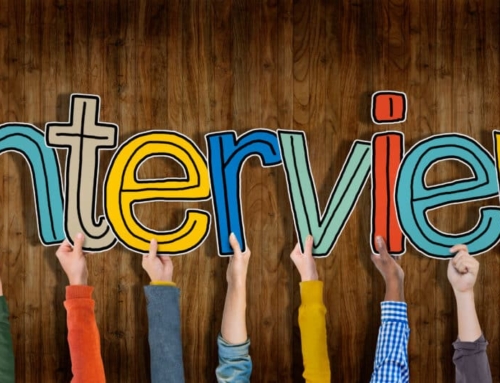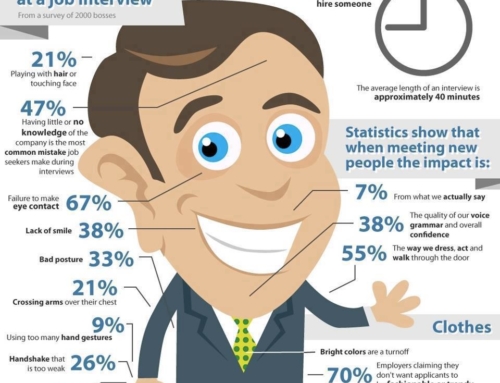By Janice Burch, Executive Resume Writer, Career Coach, Co-Owner at Pro Resume Center, LLC
Your resume got you in the door, and you landed the interview. You did your company research. Picked up your suit from the cleaners. You look amazing.
You are ready for the glare and the grill of the interviewer.
You sit down in the chair and cross your legs. As the interviewer takes a moment to review your resume, you start nervously tapping the foot of your crossed leg to a beat in your head as you bite your lower lip. Your hands begin to fidget, and you start picking at the loose cuticle around your thumbnail. You slouch down in the chair as he finishes reading through your resume, unaware that you have done so.

And though you may not think so, the interviewer picks up on everything.
His or her thoughts: Nervousness. Lacks confidence. Feels out of place. Perhaps not qualified. Maybe he lied on part of his resume.
Many thoughts go through the minds of hiring personnel when they first meet an applicant. Our body language can tell an interviewer as much, if not more, than our words as to whether we feel we are qualified for the position.
Below are the top 10 body language mistakes you can make when interviewing. Take note of these and be aware. Do some practice runs with a friend or family member. Old habits are hard to break but this is one time when you will want to ensure you have EVERY EDGE over the other applicants. It would be a shame if a judgment is made about your abilities based on nervous habits you can easily fix.

Here you go – The 10 Worst Body Language Mistakes You Can Make In a Job Interview:
-
- Slouching: Leaning back in your chair makes you appear either lazy or arrogant. Leaning forward makes you look too eager or aggressive. Experts say your best bet in an interview is to sit up straight in the chair, without letting your back touch the back of the chair. Pretend as if a string is connecting your head to the ceiling to keep your posture in check.
- Breaking Eye Contact: Don't stare, but try to hold your interviewer's gaze for an extra second before breaking away from the first handshake. It establishes a personal connection with them and lets them know you are engaging. During the interview pay attention and maintain good eye contact. It shows authenticity, sincerity and an earnest intent.
- Pointing: Agreed that this might be a way to make a point but that and the action of “chopping” with your flat hand to make a point creates a space between you and the interviewer and can be viewed as overly aggressive.
- Crossed arms: Crossed arms over your chest signal defensiveness and resistance and you appear less approachable. Keep your arms at your side or hands folded gently on lap to appear more open to conversation and open to the interviewer.
- Excessive Nodding: You don’t want to look like a baseball bobble head figurine. Often, we are unaware of how much we are nodding our head as people speak to us. A few nods with a smile of agreement works but find your center and keep your head there while focusing on paying attention, good eye contact and appropriate affirmations like, “Yes, I see,” or “that makes sense.”
- Fidgeting: Your mother used to tell you all the time “stop fidgeting!” This is one time you should heed mom’s advice. The nervous energy you display whether with finger nail biting, shifting in your chair too much, crossing and uncrossing and crossing your legs again and again or jingling the coins in your pocket will distract the interviewer and show your lack of confidence and make you seem like a Nervous Nelly.
- Hands Behind Your Back: It's important to appear approachable and open, so don't try to control gestures or fidgeting by keeping your hands locked behind your back. This is especially important when you begin to speak. Keeping your hands in your pockets or behind your back inhibits movement and makes you appear stiff. Bring those hands out in front and use them in a casual manner when speaking during your interview.
- Mismatched Expressions: Does your facial expression match the enthusiasm of your voice? If someone asks you during your interview what you're most passionate about and your face looks like it’s been embalmed or deadpan as you answer, interviewers may see this as a lack of sincerity.
- Shifty eyes: Be aware of any habits to shift your eyes upward as you speak. It can suggest someone is lying or not sure of themselves. It's important to look someone directly in the eye to convey certainty, confidence and honesty. There is a distinct line between good eye contact and staring during an interview. Be aware of this. You do not want to look creepy by appearing as though you are hexed on the person with a long, no-blink stare. Maintain good eye contact but look down when you need to take a moment to gather your thoughts in response to a question. Locking eyes with someone for an extended period of time can be interpreted as aggressive, not to mention creepy.
- Be aware of what your body language is telling the interviewer about your attention, professional image, confidence and ability to represent their company well in any setting – social or professional.

Don't let these nervous habits distract the interviewer. Be aware of these potential pitfalls to help you maintain control in the interview and keep the focus on your skills and strengths
###
Pro Resume Center, LLC offers world-class career support services, from exceptional resume and materials writing to career coaching and interview coaching. We provide one-on-one consultations with EVERY purchase, connecting you with experienced, seasoned professionals who understand how to strategically position you for job search success. CLICK HERE to learn more.





